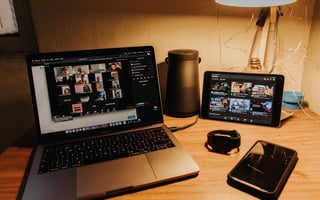One of Kamala Harris’s media interviews has caused a storm. Not because of anything the Democratic...
Training by videoconference has grown over recent years.
And as the coronavirus crisis has intensified and offices have closed, it is becoming even more prominent.
But can you really carry out an effective media training or crisis communication training course online?
Well, we’ve been carrying out media training by videoconference long before coronavirus dominated everyone’s lives.
And we believe that not only are these courses effective, but that they also best prepare spokespeople for the demands of the current media landscape. Here’s why:
Advantages
First, let’s list some of the advantages to training by videoconference before going into more detail.
- No travel (more time, less cost).
- No physical meeting space required (no more battling for that boardroom with Barbara from accounts).
- Unlimited number of breakout rooms so the group can be split into smaller working groups.
- Opportunity to practice down-the-line interviews using technology that journalists are actually using.
- A chance to get a group of delegates together for team building around a common goal.
- Online sessions are typically shorter, with more breaks for interview and message preparation and sessions can be adapted to meet the home working commitments of the delegates.
Practical
When people think about media training by videoconference, they typically picture a Skype call with a tutor.
Some may show you footage of a mock interview at the end.
But we think online courses should be more than that and that delegates should still be put to the test and take an active part in their learning.
That is why we have insisted our videoconference training remains highly-practical and, to enable this, most courses are delivered on a ratio of three delegates to one tutor.
Instead of coming into a TV studio, we put spokespeople to the test with a down-the-line TV and radio interviews on video conferencing software. This allows us to record and instantly playback interviews so our tutors can provide instant feedback and evaluation.
Telephone print interviews have formed a key part of our training and they will continue to do so online at a time when this is the most likely format a reporter will use. We use dedicated telephone journalists for this part of the training and they write the headline and opening paragraphs of the story so that delegates can see how what they said translates into print.
Additionally, the technology we use enables the use of breakout rooms for pair and group work among the delegates, as well as interactive shared screen, polls, and private and group chats, and the feedback from those we have training is that this is leading to some beneficial conversations and shared learning experiences.
Here is what Rebecca Gillick, a senior communications executive at the Institution of Engineering and Technology (IET), said about an online media skills training courses she booked:
Realistic
Good media training should always put spokespeople to the test in realistic scenarios and formats.
Training by videoconference reflects the way the media landscape has rapidly changed in recent weeks.
While our broadcast quality television and radio studios are usually the perfect way to prepare spokespeople for the pressure of being interviewed in a studio, government restrictions on movement mean that virtually all interviews are now being carried out remotely online.
And online interviews present spokespeople with some unique challenges, as you will probably have noticed from watching the news over the past few weeks.
As well as knowing the message they want to get across and being prepared for the tricky questions, they also need to consider the best camera angle, the right lighting and sound and the quality of the internet connection.
In fact, you are no longer just a spokesperson, you are also a camera technician, a sound engineer and a lighting director.
So, it is crucial spokespeople understand these demands and are prepared to be the best they can be on their laptops.
The skills we teach will also help senior leaders to communicate better with their teams remotely while so many of us are working from home.
Bespoke
A concern people often seem to have with online training is that it works on a ‘one size fits all’ approach.
But it doesn’t have to be that way.
We ensure that our online courses are bespoke and cater for the exact needs and requirements of those taking part.
For example, some of our recent media training courses have also incorporated sections on improving online meetings as delegates seek to improve their presentation skills for the demands of video conferencing.
This was something Mamta Singhal, a commercialisation manager in the fast moving consumer goods sector and IET Council member, appreciated:
Current working journalists
Just because a course is online, doesn’t mean you should miss out on the opportunity to be tested by current working journalists.
Not only are our online courses led by current working journalists, but they are delivered by those who have been using video technology increasingly in their reporting in recent years.
For example, our tutors who have worked in BBC radio newsrooms will have been using FaceTime and Skype for their interviews because those channels have been regarded as having better sound quality for some time.
Here is what Amber O’Connor, an equipment health monitoring and performance engineer for Siemens Aeroderivative Gas, who took part in the course we delivered for IET had to say:
Experience
Online media training by videoconference is not new for us.
We have been delivering courses online for the past five years and it has grown in popularity as diary constraints have made it difficult for some organisations to get all their delegates into the same place at the same time.
We have been delivering training to delegates from different countries at the same time without leaving our office.
This has allowed us to develop and fine-tune our videoconference training and has put us in a good position to meet current demand.
Additional learning
We’ve always believed that our courses should be more than just a training day.
And the same is true for our online courses.
As well as being able to access all of their broadcast interviews from the training through our secure library, delegates are also supported by a range of ‘out the classroom’ learning materials, including short videos presented by our tutors and eBooks specific to your sector.
This helps to ensure they continue to develop after the course.
Ultimately, we believe that online media training will only be as good as what the training company could offer in the traditional face-to-face environment.
So before you book your course, ask yourself a few questions:
Does the training offer lots of practical exercises?
Is it designed to meet the needs and requirements of your organisation and delegates?
Is the training led by a journalist who is using online video interviews in their day-to-day reporting?
Does that trainer have support to put the training together and deal with any technical issues?
Does the course offer support for delegates to continue their learning after the training session?
Want to find out more about our online training or improve your skills from your home? Get in touch through hello@mediafirst.co.uk.
Media First are media and communications training specialists with over 30 years of experience. We have a team of trainers, each with decades of experience working as journalists, presenters, communications coaches and media trainers.
Subscribe here to be among the first to receive our blogs.




